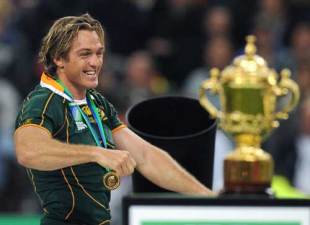|
World Cup 2007
South Africa win the carnival
Scrum.com

Percy Montgomery waits to get his hands on the World Cup
© Getty Images
Enlarge
England 6 - 15 South Africa
Argentina 13 - 37 South Africa
France 9 - 14 England
Argentina 19 - 13 Scotland
Fiji 20 - 37 South Africa
France 20 - 18 New Zealand
Australia 10 - 12 England
News | Photos | Results | Tables
World Cup No. 6
Format The 20 countries were arranged into four groups of five, with representatives from Europe, Oceania, Asia, the Americas and Africa making up the colourful group line-up. The groups were contested on a league basis, with each team playing each other once. Four points were awarded for a win, two for a draw and none for a defeat. Bonus points were awarded for teams scoring more than four tries or for losing by less than seven points. The top two nations from each group progressed to the quarter-finals, with group winners playing the second ranked teams from other groups. From there the winning sides progressed to the semi-finals and then the final or third-place play-off.
Pre-tournament hype
Pool Stages South Africa tore through Group A, winning all four of their games. Their passage to the quarters included a 36-0 hammering of England and a close run 30-25 win over a heroic Tonga side. England joined South Africa in the quarters with wins over Samoa and Tonga. Pool B saw the Wallabies advance with four wins, including a crucial 32-20 victory over Wales in Cardiff. Fiji joined them in the quarter-finals following a 38-34 victory over Wales, held by many to be the game of the tournament. New Zealand powered through Group C with maximum points following big victories over Scotland and Italy. Scotland eventually joined them following a dour 18-16 victory in the pool decider against Italy.
Knockout Stages In the first of the semis, England crushed French dreams of lifting the cup on home soil with a 15-9 win. Josh Lewsey's early try following a catastrophic error by Damien Traille was enough to send Brian Ashton's team into their second consecutive final. South Africa then proved too much for the plucky Pumas, finally ending their adventure with a convincing 37-13 victory. Brian Habana ran in two scores for the Springboks in securing his place as the tournament's top scorer.
Final In a game dominated by the side's big forward packs, it was the duel between the boots of Jonny Wilkinson and Percy Montgomery that would decide the match. Montgomery landed five penalties to Wilkinson's three, and despite the contentious decision to disallow a Mark Cueto "try" the Webb Ellis Trophy returned to South Africa.
Star of the Tournament
Frozen in time Springbok fans saw their team take the trophy home, but perhaps the finest on field moment of the tournament came with Argentinean full-back Ignacio Corleto striding in to score his team's try that defeated France in the opener. The moment encapsulated the pride and passion of his team and their arrival on the world stage. © Scrum.com
|
Live Sports
Communication error please reload the page.
-
Football
-
Cricket
-
Rugby
-
- Days
- Hrs
- Mins
- Secs
F1 - Abu Dhabi GP
Abu Dhabi Grand Prix December 11-131. Max Verstappen ()
2. Valtteri Bottas (Mercedes)
3. Lewis Hamilton (Mercedes)
4. Alexander Albon ()
5. Lando Norris ()
6. Carlos Sainz Jr ()
-
ESPNOtherLive >>
Snooker - China Open
Tennis - Miami Open

